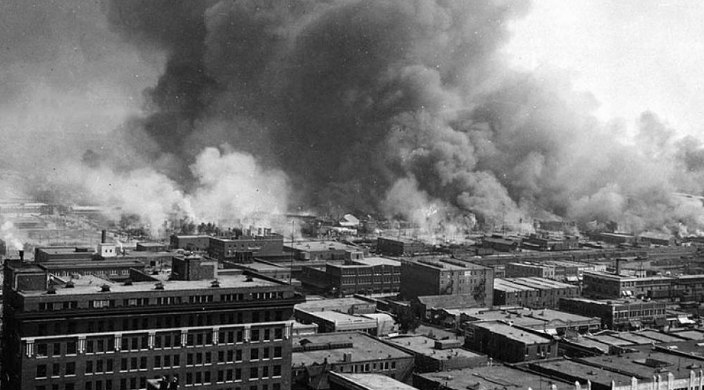
Those closest to me know I’m a big fan of Marvel and DC comics, movies, and TV shows. I’ve written about how "Avengers: Endgame" helped prepare me for my adult bar mitzvah (during which I wore a Marvel-themed kippah) and how "Black Panther" can inspire the Jewish community.
However, my favorite comic is "Watchmen," a DC comic dedicated to deconstructing and parodying the idea of “superheroes” as flawed, complex individuals while invoking Cold War paranoia and other historical/sociopolitical themes.
One of Time Magazine’s 100 Best Novels since 1923, "Watchmen" has inspired a 2009 film adaptation, a prequel and a sequel comic series, and, most recently, an HBO miniseries sequel. Needless to say, I went into this miniseries with anticipation and excitement, but I wasn’t quite prepared for the gravity it had in store.
In the first episode, we see a little Black boy sitting in a silent movie theater. Outside, chaos ensues: sirens, gunshots, explosions, people screaming in terror. The theater itself starts to crumble as the child’s parents rush him out of the building.
A caption reads, “Tulsa, 1921.” A mob of white people, some donning Klan robes, attack Black families and business owners. Buildings are looted and shattered, a man is set ablaze, a Black child carries a dead baby in his arms, a car drags two Black bodies through the streets, and biplanes drop explosives onto buildings.
The child and his parents join a group of Black people attempting to escape, but there’s only room in the car for the boy. His parents bid him a tearful farewell as he, like Superman escaping Krypton, is transported away from the collapsing world around him.
What many people don’t know is that this actually happened.
It’s called the 1921 Tulsa Massacre/Black Wall Street Massacre, incorrectly known as the 1921 Tulsa Race Riots, in which a white mob looted and massacred the Tulsa neighborhood of Greenwood, also known as “Black Wall Street” due to the presence of many successful businesses run by Black residents.
According to "The Encyclopedia of Oklahoma History and Culture", it is “the single worst incident of racial violence in American history.” In 2019, state archaeologists began a search for long-rumored mass graves – as part of a murder investigation.
As written in a New York Times article, "The Tulsa race riot of 1921 was rarely mentioned in history books, classrooms, or even in private. Blacks and whites alike grew into middle age unaware of what had taken place." I only heard about the massacre a few years ago.
As a Jew, I know how important it is to remember horrific parts of history, such as the Holocaust, Kristallnacht, the Inquisition, and countless other atrocities committed against the Jewish people. Simultaneously, as a Black American, I feel both a sense of shame for my ignorance about the massacre and anger that I was never taught about this at any point in my education.
It distresses me that so many Americans are just now hearing about this, not through our education system, but through a superhero TV show.
Two Jewish artists involved with the show, creator Damon Lindelof and co-producer/director Nicole Kassell, say they only learned about the massacre in creating the show. In an interview with Tulsa World, Lindelof credited Ta-Nehisi Coates’s "The Case for Reparations" with teaching him about the massacre.
“I was 43 or 44, and I wondered how could it be that I’ve never heard about this,” Lindelof said. “Then I read more, and I said Tulsa was the right place to set the show.”
in a Slate.com interview, Kassell said:
“Enormous amount of time went into planning that [scene] [and we] did everything as historically accurately as possible. We went to Greenwood and Tulsa and met with the people there…We happened to be filming on the 97th anniversary. Our day one of production was day one of the massacre [97 years before].”
Kassell said she had never directed anything like this scene before. She and Lindelof wrote a letter to the entire cast and crew, including background and stunt actors, appreciating what was being asked of them.
As a Jewish writer and cinephile, I am thankful for artists like Lindelof, Kassell, and the show’s cast and crew for bringing this forgotten horrific chapter of American history to the surface.
Many see comic books and the media based upon them as mindless entertainment, but in doing so, they ignore the vast social commentary embedded within them and their power to inspire others to create change and repair the world. With "Watchmen," the show’s creators are doing what the American educational system should have done for decades: teaching about the single worst act of racial violence in this nation’s history.
If we, as Jews, are to never forget horrific acts of antisemitism, we are also never to forget atrocities like the 1921 Tulsa Massacre, either. Acknowledging stories like these is never easy and will undoubtedly bring discomfort – but doing so is vital in making sure history does not repeat itself.
When sharing stories about Black history in our congregations and religious schools, I encourage other Jews to educate themselves about the Tulsa Massacre and make sure the next generation of Jews know about it, too. Only then can we help create a society where people won’t have to learn about this through a piece of entertainment, but through the brave voices of those willing to teach it.
Related Posts

Harnessing the Power of our Mothers Around the Seder Table

Melding Tradition and Innovation: Our Interfaith Toddler Naming Ceremony

